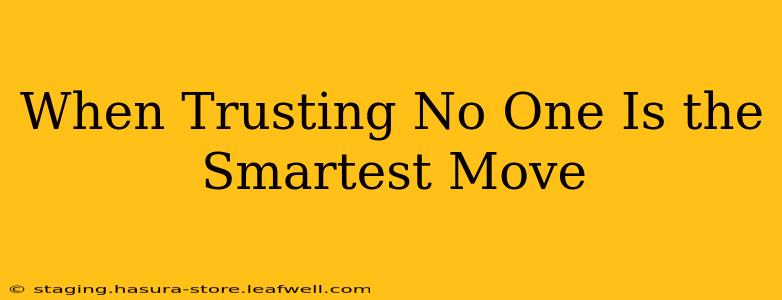In a world brimming with deception and betrayal, the decision to trust no one might seem extreme. However, there are situations where a guarded approach, prioritizing self-preservation and critical thinking above blind faith, becomes not only a survival tactic but also the smartest move. This isn't about becoming cynical; it's about cultivating a healthy skepticism and strategic discernment in navigating complex relationships and high-stakes scenarios. This article explores when and why trusting no one is the wisest path.
What Situations Warrant Extreme Caution?
Several scenarios demand a heightened level of skepticism, urging us to approach interactions with a healthy dose of distrust:
-
High-stakes financial transactions: Investing large sums of money, especially in unfamiliar ventures or with individuals you've just met, requires meticulous due diligence. Thoroughly verify credentials, seek independent legal and financial advice, and proceed with caution. Trusting someone blindly can lead to devastating financial losses.
-
Confidential information sharing: Sharing sensitive personal or professional information requires careful consideration. Before divulging anything confidential, evaluate the trustworthiness of the recipient and the potential consequences of disclosure. Protecting your privacy and sensitive data is paramount.
-
Entering into new business partnerships: Starting a business with someone you don't know well requires thorough vetting. Investigate their background, track record, and financial stability. Legal contracts, independent appraisals, and clear communication are vital for mitigating risk. Trust without verification can lead to disputes and business failure.
-
Navigating complex interpersonal relationships: Some relationships, especially those involving significant power imbalances or histories of betrayal, may require a cautious approach. This doesn't mean avoiding intimacy, but it does mean maintaining boundaries, seeking external validation, and proceeding slowly. Trust should be earned, not assumed.
-
Situations with potential for manipulation or exploitation: Be wary in situations involving individuals who seem overly charming, overly helpful, or exhibit signs of manipulative behavior. Trusting someone in these instances can lead to exploitation, emotional distress, or even physical harm.
Is It Always About Distrust?
It's crucial to understand that choosing to trust no one doesn't equate to complete isolation or paranoia. It's about practicing informed consent and strategic skepticism. This approach involves:
- Due Diligence: Thoroughly investigate claims, credentials, and intentions before making significant decisions based on trust.
- Verification: Cross-check information from multiple independent sources to ensure accuracy and avoid misinformation.
- Boundary Setting: Maintain healthy boundaries and avoid situations that could compromise your safety or well-being.
- Observational Skills: Carefully observe behavior and actions to identify inconsistencies or red flags.
- Seeking External Validation: Consult trusted advisors or professionals before committing to major decisions that involve trust.
How to Approach Interactions With Caution
The art of navigating trust lies in adopting a pragmatic approach. Instead of blanket distrust, cultivate a discerning eye:
- Assess Risk: Evaluate the potential consequences of trust versus distrust in a given situation.
- Gather Information: Collect as much relevant information as possible before committing to trust.
- Observe Behavior: Pay attention to actions rather than words, and notice any discrepancies.
- Trust Incrementally: Build trust gradually, through consistent demonstration of reliability and honesty.
- Re-evaluate Regularly: Trust is not a static state. Continuously assess the trustworthiness of others based on their ongoing actions.
What are the potential downsides of never trusting anyone?
While caution is vital, constantly suspecting everyone can lead to isolation, missed opportunities, and a sense of pervasive negativity. It's a delicate balance: knowing when to be cautious and when to cautiously extend trust.
How do I know when to trust someone?
Trust is earned, not given. Observe consistent honesty, reliability, and integrity over time. Look for actions that align with words and a pattern of respectful behavior.
Can you trust anyone completely?
Complete trust, particularly in potentially high-stakes situations, is rarely warranted. However, developing strong, trusting relationships is crucial for a fulfilling life. This requires selectivity and a commitment to building bonds through mutual respect and shared values.
In conclusion, while outright distrust may appear extreme, understanding when and how to approach situations with caution is an essential life skill. It’s about navigating the complexities of human interaction with wisdom, discernment, and a healthy dose of self-preservation. Remember, it’s not about cynicism, but about informed consent and strategic skepticism, leading to smarter, safer decisions in life's high-stakes moments.

